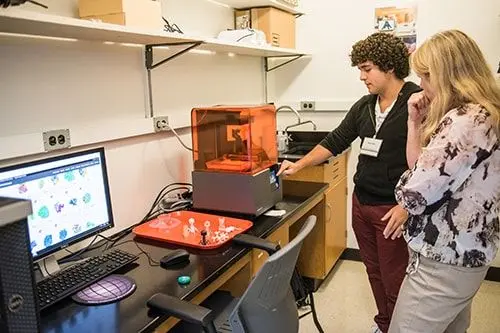Expanded facilities offer services for UMBC and local start-ups
03/13/2017| Sarah Hansen
Article Topics:
Expanded facilities offer services for UMBC and local start-ups
03/13/2017 | Sarah Hansen
Guest feature: Sarah Hansen is the STEM Communications Manager at UMBC. Follow along with UMBC on Facebook and Twitter.
Dean Bill LaCourse, of the College of Natural and Mathematical Sciences (CNMS), has been working for 20 years to build up a set of core analysis and imaging facilities at UMBC, open to the full UMBC community, local startups, and other institutions in need of these research tools. The campus celebrated the realization of his vision on February 24 with the Core Crawl, a special event where dozens of guests toured four core facilities, guided by their managers.
The Keith R. Porter Imaging Facility (KPIF), Nano-Imaging Facility, Research Graphics, and Molecular Characterization and Analysis Complex (MCAC) each offer unique tools to support scientific research, from mass spectrometry to scientific animations. The facilities' most recent addition is a state-of-the-art transmission electron microscope recently donated by the Howard Hughes Medical Institute's Janelia Research Campus.
Tools like these "are all about the most fundamental aspect of science—observation," says LaCourse, and they "leverage and extend our capabilities so we can look at everything from the atom to the ends of the universe."
The four UMBC facilities are unique among similar facilities at other universities because their directors do much more than analyze experimental samples for researchers. "The leaders of these facilities really are your allies as you are trying to gain new knowledge," says Karl Steiner, vice president for research at UMBC. "They bring their expertise to your problem and work with you to get somewhere you may not have known you could go." He adds, "It's not the newest and latest instrument that makes a facility successful—it's the people who run it and work with you."
One of those people is Tagide deCarvalho, manager of the KPIF, who stressed the teaching and learning aspects of the facilities. "I'm really interested in helping people at all levels," she shared, "from sample prep, to instrument training, to experimental design."
As university-based facilities, the labs are also able to provide low rates for instrument time, which is particularly useful for local start-ups. Before making a major investment in expensive equipment, new companies can get advice from dedicated staff and determine what instrumentation they might need down the road.
Keep up with the latest.
Sign up for e-mail notifications.
